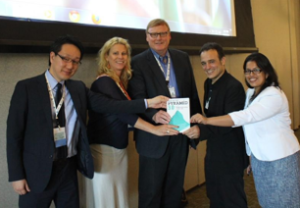Knowledge Generating: Publication and Launch of the book Base of the Pyramid 3.0: Sustainable Development through Innovation and Entrepreneurship.
By Stuart L. Hart and Fernando Casado Cañeque
Great progress has been achieved since the BoP concept appeared. Today, it is of great satisfaction to see how governments, international organisations, civil society and, in particular, companies from all over the world not only have adopted the concept but are actually endeavouring to develop frameworks and management systems that bring them closer to the real needs of BoP communities so they can work alongside them as partners to create social value.
However, the application of disruptive innovations and the creation of more inclusive business models can generate new innovative commercial opportunities with tremendous potential to both scale laterally as well as “trickle up” to the top. In fact, by developing inclusive businesses, low-income communities can potentially gain greater access to goods and services, a wider range of choices and better opportunities to improve their present and future, while companies are exposed to new growth markets than can boost their competitiveness and capacity for innovation.
Nonetheless, despite the interesting potential of BoP innovative business models, ensuring success in its implementation has proven to be challenging. There are still many methodological and management deficiencies that need to be addressed, such as developing proper co-innovation processes with BoP communities, understanding and enhancing the full potential of generating social and economic value throughout the full life cycle of product and service processes, and exploring upscaled and replicated models of successful pilot cases.
Essentially, it must be ensured that business models are framed under specific concepts, i.e. availability, addressing challenges in distribution as BoP markets can be fragmented or non-existent; affordability, addressing low-income needs and matching the cash flows of customers who often receive their income on a daily rather than on a weekly or monthly basis; awareness building, heightening awareness and education in environments with limited media access and non-existent traditional media exposure; and acceptability, which implies adapting products and services to BoP demand and responding to socio-cultural dimensions.
With these objectives in mind, we decided to join global practitioners of the BoP Global Network and write the book Base of the Pyramid 3.0: Sustainable Development through Innovation and Entrepreneurship. This new book seeks to kindle a debate on the role innovation plays in generating value at the different levels of the BoP. It aims to contribute towards moving the inclusive business agenda forward by sharing such experiences with practitioners engaged in the global commitment to improving the lives of the BoP community by putting forward more innovative and inclusive business models.
If the BoP 1.0 model can be summarized as “finding a fortune at the BoP”, then the BoP 2.0 approach stresses the importance of co-creating products and compelling value propositions with underserved communities, innovating from the bottom-up, leapfrogging to environmentally sustainable technology, and creating a dedicated set of metrics and timelines suited to the unique features of the underserved space.
However, although we are still in the midst of developing the new skills, capabilities, and organizational routines necessary to execute BoP 2.0, additional challenges revealed make it relevant to press forward towards a BoP 3.0.
The book therefore aims to contribute to stretch our thinking towards BoP 3.0. This path implies proposing a transition from co-creation to open innovation, drawing on the “wisdom of the crowd” to spawn previously unimagined solutions. Indeed, participatory, grassroots innovations may take BoP business to a whole new level in the years ahead.
Such process requires a conceptual shift, passing from stand alone initiatives to innovation ecosystems, from extended distribution approaches to innovation for the last mile, from NGO Engagement to cross sector partnership networks and from poverty alleviation to sustainable development frameworks, emphasizing in the importance of integrating both environmental sustainability and an integrated (triple bottom line) perspective into the BoP space. Actually, potential even exists to use BoP business logic to incubate new models to better serve and include the underserved populations in the developed world.
Therefore, the ultimate goal of this book is to try to move the inclusive business agenda forward and aim to transform the entire socio-economic system in which the poor find themselves. Thus, it emphasizes the urgent need for scalable solutions rather than specific pilot projects that have achieved only certain level of impact through local implementation. It is an invitation to create an open debate with the practitioner community at considering what might be able to work that generates a profound social transformation on the whole ecosystem rather than just new business models or products that are green or socially responsible. We hope you join us in this debate and look forward to jointly, keep moving the inclusive business agenda forward.


